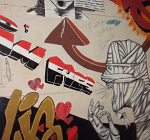The prison sentences handed out to journalists – Mohamed Fadel Fahmy, an Egyptian-Canadian, Peter Greste, an Australian, and Baher Mohamed, an Egyptian – by the Abdul Fattah el-Sisi government, highlights the iron fist of the newly-elected Egypt government, and shows how basic human rights are being compromised under the garb of national security. The incident is a reminder of how the present military-backed government has repeatedly violated the freedom of the press, and that the witch-hunt against those linked to the previous Muslim Brotherhood government and their sympathisers is far from over.
Greste and Fahmy were sentenced to seven years in prison, while Baher Mohamed was sentenced to an additional three years for possession of ammunition. According to the Qatar-based news channel Al Jazeera, Mohamed was in possession of a spent bullet casing he had found on the ground during a protest.
The charges against the three include editing video footage to falsely “give the appearance (that) Egypt is in a civil war,” operating broadcast equipment without a license, and membership in, and support for, a “terrorist organization.” Human Rights Watch which reviewed the material prosecutors presented in court, spoke with independent observers who monitored the trial, says it found no evidence indicating any criminal wrongdoing.
This is not the first time Egypt’s military rulers have shown their displeasure against the reporting done by Al Jazeera which has long been accused by some of serving the Islamists’ agenda since its inception in mid-1990s. The fact that it is supported by Qatar, one of the biggest rivals of Egypt’s military rulers, led to the persecution of its journalists in Egypt. During the 2009 Gaza conflict, the then President, Hosni Mubarak, minced no words when he criticised Al Jazeera for drawing attention to the humanitarian crisis arising out of his government’s reluctance to opening up the Gaza Strip and allowing aid to the Palestinians.
Al Jazeera made no secret of its support for Mohamed Morsi the Islamist Muslim Brotherhood candidate when he was elected as the president in 2011. Morsi won the second run-off by winning 51.7% of the vote against the army-backed candidate Ahmed Shafik. When President Morsi was toppled in a military-backed coup in July last year, the threat to Al Jazeera journalists was at an all-time high. It did not help matters when the Doha-based channel aired a feed from inside the Al-Fatah Mosque at Ramses Square in Cairo which seemed to suggest that the army had engineered a situation of emergency. This led to more bad blood between the channel and the government.
What is interesting to note that Sisi seems determined to repeat the mistakes made by the Mubarak government. The two leaders have the same enemies, and are using draconian tools to silence their critics.
Article 70 of Egypt’s new constitution adopted in January this year guarantees freedom of the press, while Article 71 prohibits government censorship of media outlets, except in “times of war or general mobilisation”. However, even before he was officially elected, Sisi had announced to the editors of the nation’s primary newspapers that freedom of the press should be balanced with national security.
The recent verdicts have taken the threat level many notches higher, and sent out a chilling message to all journalists, particularly Egyptian journalists who do not even have the support of the international media or foreign governments to strongly plead their case. Many reporters working with Egyptian newspapers say they have orders to not say a word against Sisi. Even a nuanced account is edited and turned into an account of the president’s benevolence. Clearly the arrests of journalists is part of a larger campaign to crush domestic opposition. One must remember that when you start arresting journalists, the freedom for those not in jail shrinks, too.
The classification of Egypt sharing the same “not free” space as North Korea, Cuba, Equatorial Guinea, Eritrea and Iran in the Freedom House Report 2014 by Freedom House, a U.S.-based non-governmental organisation, points to the fact that the democratic ideals of Tahrir Square have been greatly dishonoured by military strongman Abdel Fattah el-Sisi.
Mind you, Egypt is a democracy, or at least, it’s supposed to be.
Saumya Pant, is Senior Content Manager, Digital, Gateway House.
This blog was exclusively written for Gateway House: Indian Council on Global Relations. You can read more exclusive content here.
For interview requests with the author, or for permission to republish, please contact outreach@gatewayhouse.in.
© Copyright 2014 Gateway House: Indian Council on Global Relations. All rights reserved. Any unauthorized copying or reproduction is strictly prohibited


